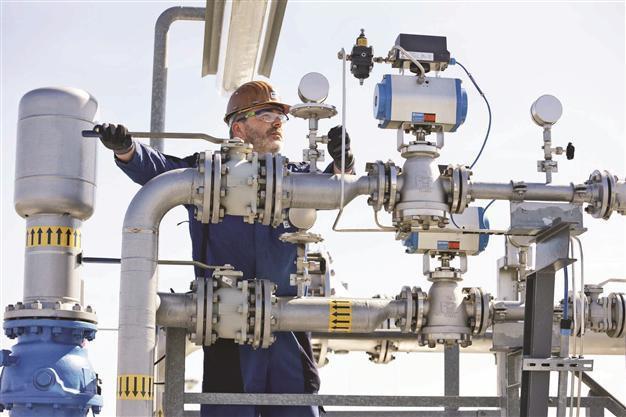High hopes of Austrian firm lie in Black Sea
LONDON

OMV’s preliminary estimate on the Neptun Deep finding in Romania stands at between 42 to 82 billion cubic meters. The company also holds 30 percent search rights in Bulgaria’s Khan Asparuh block with Total and Repsol and another 15 percent in Ukraine’s Skifska, partnering with ExxonMobil and Shell.
OMV is raising hopes it will carry dramatic amounts of gas to Europe from its claimed finding in a Black Sea field off Romania, putting the region at the heart of its future plans.
However, the priority for Romanian resources is to meet the domestic demand in the Balkan country, executives at the Austria-based energy company, which also owns Turkey’s Petrol Ofisi, said.
The assertive partner to West Nabucco, one of the two consortia hoping to win the transfer of Caspian gas via the planned $7 billion Turkey-Azerbaijan Trans Anatolia Pipeline (TANAP) project, says its suggested route, likely to be backed with possible Black Sea findings, will help Europe reduce its Russian dependency for natural gas.
The choice between West Nabucco and rival Trans Adriatic Pipeline (TAP) is a political one, said Gerhard Roiss, chairman and chief executive of OMV, during a press meeting in London yesterday, arguing that West Nabucco is strategic since it suggests carrying the Caspian gas over a route that covers countries that are 100 percent dependent on one certain country, without naming Russia.
However, the TAP route is a plan that would carry the crucial resource to southern Europe, which has access to North African resources, according to the chairman.
“Europe needs a clear positioning in energy,” Roiss said.
American way or Japanese wayCiting U.S. President Barack Obama’s post-election promise to cut the world’s largest economy’s energy dependency and claiming that Japan will be a 90 percent gas importer by 2035, Roiss said Europe had two choices: the American way or the Japanese way. The American way needs the boosted utility of European sources, he added.
“Does Europe have own its own gas? Yes. The Black Sea and the North Sea,” he said.
These are the two main spots where OMV is focusing in its consolidation plans, under the motto: “Less products, less countries, bigger size.”
The final decision on the venture winning the TANAP gas will be made by the Shah Deniz II consortium mainly controlled by Azerbaijani state companies and BP.
OMV’s preliminary estimate on the Neptun Deep finding in Romania, first announced in February this year, stands at between 42 to 82 billion cubic meters per year. The company also holds 30 percent search rights in Bulgaria’s Khan Asparuh block with Total and Repsol and another 15 percent in Ukraine’s Skifska, partnering with ExxonMobil and Shell. These three blocks neighbor each other and OMV’s future plans include an off-Turkey search if the Bulgarian activity bears results.
“It is key for Europe, key for Romania,” said Roiss on the Romanian search. “The Black Sea is the future of energy.”
Recently, BP announced that its off-Turkey search in the Black Sea had produced no results, but the Turkish Energy Ministry is insisting on further efforts.
The largest project that challenges the via-Turkey gas plans is South Stream, which this month became more concrete with provider Russia’s deal with Bulgaria. The route to Italy also includes Serbia, Slovenia and Hungary.
However, OMV downplays the competition. Roiss said, “If there will be two pipelines [to Europe], it is better than one.”
The company’s investment and production-increase plans are not limited to the Black Sea, with board member Jaap Huijskes saying at yesterday’s event that the company was planning several acquisitions in less than one year. This will add to OMV’s recent buyouts in a large landscape from Norway to Abu Dhabi, new territory for the Austrian firm.
